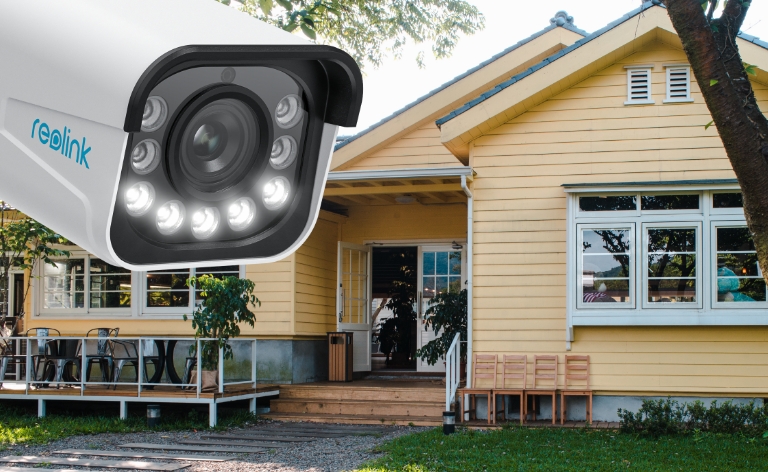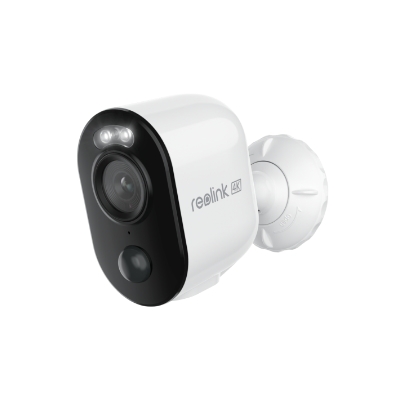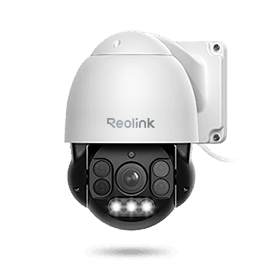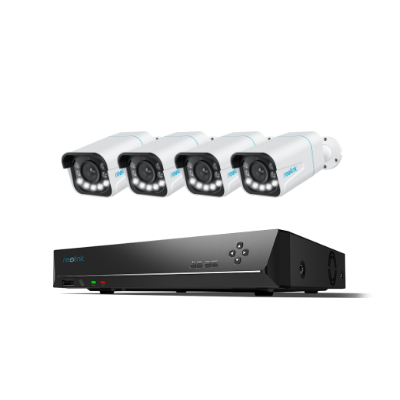How Long Do Security Cameras Keep Footage?

In the world of surveillance, the duration for which security cameras retain footage is a pivotal aspect that goes beyond mere storage. The loss of crucial footage could mean a potential void in your ability to address critical incidents. This article explores the significance of the right storage duration for identifying threats, understanding security patterns, and ensuring the lasting impact of your surveillance system.
How Long Do Security Cameras Keep Footage?
Typically, most security camera footage is retained for a period of 7 to 90 days.
The exact duration that a CCTV camera saves footage on also depends on the different devices and how they are saved.
Security camera systems, whether DVR or NVR, typically retain footage for a set duration, often ranging from 7 to 30 days, with some high-capacity systems capable of storing footage for months. Conversely, cloud-based systems offer storage through subscription plans, where basic tiers may retain footage for a limited number of days, while premium tiers extend this duration to several weeks or months.
Many systems employ motion-activated recording to conserve storage, adjusting retention based on motion frequency. Continuous recording systems, however, with no reliance on motion, necessitate larger storage capacities and offer shorter retention periods. Upon reaching storage limits, some systems overwrite older footage automatically, while others require manual deletion.
Compliance with legal and regulatory mandates further influences retention periods, varying based on jurisdiction and establishment type. For instance, financial institutions, like banks, might be obligated to store footage for six months or more, while casinos could be required to keep footage for up to a year.
Where Does Security Camera Footage Store?
Security camera footage can be stored in various locations, depending on the system and configuration. The three common storage options are:
Cloud storage
Many modern security camera systems offer cloud storage solutions. Footage is uploaded and stored on remote servers, providing accessibility from anywhere with an internet connection.
NVR/ DVR
NVRs and DVRs are dedicated devices designed for video storage. NVRs are commonly used with IP cameras and store digital footage, while DVRs are compatible with analog cameras and store footage in a digital format. These devices are typically installed on-site and offer local access to stored footage.
SD card storage
Some security cameras have built-in SD card slots for local storage. The footage is stored directly on the camera's SD card. This option is useful for standalone cameras or situations where continuous internet access might be challenging. However, SD card storage has limitations in terms of capacity, and once the card is full, new footage may overwrite old footage.
Retention time for each storage
Here is a list that shows retention time for each storage:
Factors to Affect Home CCTV Camera Storage Capacity
The storage capacity of home CCTV cameras is intricately influenced by various factors. The following is the detail:
Resolution of cameras
The resolution of your CCTV cameras directly affects storage requirements. Higher resolutions produce more detailed footage but demand larger storage capacities.
Compression
Video compression techniques, such as H.264, MJPEG, and MPEG4, are pivotal in storage efficiency. Compression reduces file sizes, minimizing the space required for storage.
Bitrate
Bitrate influences both video quality and storage needs. Higher bitrates enhance video quality but increase storage demands. The interplay of resolution and compression formats further impacts bitrate requirements.
Number of cameras
The quantity of cameras in your setup directly influences storage needs. Using multiple cameras simultaneously escalates storage requirements.
Retention period (Days)
The duration for which you intend to retain CCTV recordings directly correlates with storage capacity. Longer retention periods necessitate larger storage capacities.
Recording mode
Continuous recording, motion-activated recording, or a combination of both can impact storage needs. Continuous recording consumes more space, while motion-activated recording conserves storage by capturing footage only when movement is detected.
Storage Space (GB) = Bitrate (Kbps) * 1000/8 * 3600 * 24 * Cameras * Days/1000 000 000
How to Keep Security Cameras Footage Last Longer?
To keep camera footage for longer, consider the following strategies,
Scheduled recording
Continuous recording fills your storage with potentially irrelevant footage. To maximize storage life, use a scheduled recording. Set cameras to record only at specific times, eliminating unnecessary footage and significantly cutting down on storage space. For instance, scheduling cameras to record only at night can more than double your video storage time.
Motion detection cameras
These cameras record only when there's movement, enhancing accuracy and security. Modern cameras with line-crossing functions allow you to monitor specific areas for movement and unauthorized entry. Adjust motion detection settings to target relevant events without filling up storage too quickly, especially in areas with high motion.
Export footage
Export camera footage to a computer or a separate hard drive, like a thumb drive, to preserve it indefinitely without using up the main storage space. Selectively export important events or footage for future reference.
Video compression
Implement video compression, such as H.265, to reduce the size of your footage and create more room in your storage system. Compression uses a codec to eliminate unnecessary files and shrink existing ones without compromising video quality. This frees up space, allowing you to store more footage on your server or SD card.
Adjust recording settings
Reduce the recording resolution or frame rate if high quality isn't essential for all footage. Lowering these settings can save a considerable amount of storage space.
Recommend Security Camera for Keeping Longer Footage
Selecting the right security camera is crucial for optimal storage efficiency and extended footage retention. Consider the following recommendations tailored for maximizing storage duration while maintaining video quality and security features.
Standalone Wire-Free Security Camera - Argus 3 Ultra
The Argus 3 Ultra is a standout choice for a wire-free security camera. Boasting a 4K 8MP Ultra HD resolution, it ensures exceptional clarity in surveillance. The smart detection capabilities go beyond simple motion sensing, reducing false alarms and optimizing storage. With H.265 compression technology, the camera efficiently minimizes file sizes without compromising quality.
Additionally, it supports up to a 128GB SD card and provides substantial onboard storage, allowing for extended recording periods.
4K 8MP Standalone Wire-Free Camera
4K 8MP; Smart Detection; 5/2.4GHz Dual-Band WiFi; Battery/Solar Powered; Color Night Vision; Alerts Without Subscription.
Smart 8MP PTZ PoE Security Camera - RLC-823A
The RLC-823A Smart 8MP PTZ PoE Security Camera is ideal for extended footage retention. Its 4K resolution, PTZ functionality, and H.265 compression delivers detailed, high-quality recordings while efficiently managing storage space. The camera supports SD cards up to 256GB, providing generous local storage for longer retention periods.
Smart PTZ PoE Camera with Spotlights
4K 8MP Ultra HD, Person/Vehicle Detection, 5X Optical Zoom, Auto Tracking, Manual Pan & Tilt, Two-Way Audio, 190ft Night Vision, Live View.
4K Smart PoE Security Camera System - RLK8-811B4-A
The RLK8-811B4-A is a 4K Smart PoE Security Camera System. This system provides detailed surveillance coverage with its 4K resolution and 8-channel NVR. Leveraging both H.264 and H.265 video compression standards, it balances high-quality footage with efficient storage usage. The SATA interface and the included 2TB internal HDD and eSATA interface for external HDD allow for up to 12TB of scalable storage capacity.
4K 8-Channel PoE Security System
4 pcs 4K Ultral HD Security Cameras; 2TB HDD 8-Channel NVR for 24/7 Recording; Person/Vehicle Detection; Plug & Play; 2 Network Solutions.
FAQs
1. Do home security cameras delete footage?
Yes, home security cameras can delete footage based on various settings and storage management configurations. Most modern security camera systems have features such as loop recording or overwrite functionality, which means that when the storage is full, the system automatically deletes the oldest footage to make room for new recordings.
2. How far back can a security camera go?
The duration for which a security camera can store footage depends on several factors, including the camera system's storage capacity, the video resolution, frame rate, compression settings, and whether it employs continuous recording or motion-triggered recording.
In general, security camera systems can store footage for a few days to several weeks. High-capacity storage devices, such as Network Video Recorders (NVRs) with large hard drives, can extend this duration. However, as the storage fills up, older footage may be automatically overwritten unless there's a specific configuration to save it for longer.
3. Do security cameras keep all footage?
Security cameras typically do not keep all footage indefinitely. The retention period depends on factors such as storage capacity, settings, and configuration. Most systems employ a loop recording or overwrite mechanism, where the oldest footage is automatically deleted to make room for new recordings when the storage is full.
Conclusion
Having the right storage duration for your security camera footage is important for your surveillance system. You need to determine the appropriate retention period for your needs and select the right storage options.
If you like this article and find it helpful, share it with your friends. Do you have something to say about "How Long Do Security Cameras Keep Footage"? Make sure you leave a comment below!
Search
Subscribe for the Latest Updates
Security insights & offers right into your inbox



